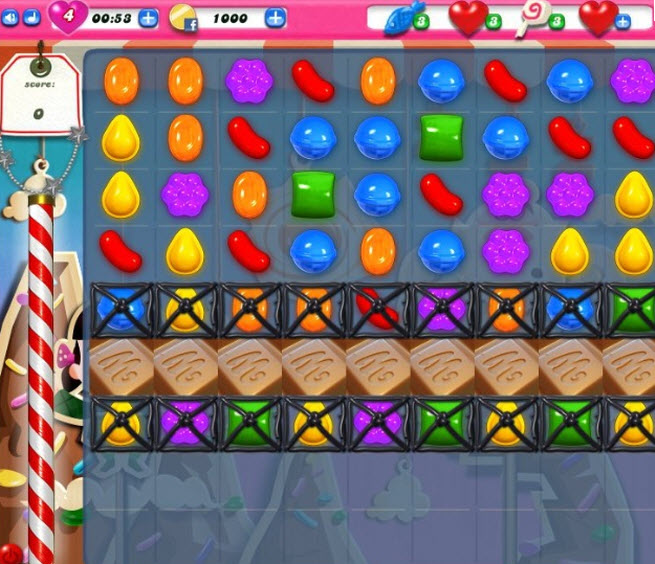Social game publisher King is giving up its trademark claim over the word “Candy.”
The Candy Crush Saga maker is withdrawing its trademark bid for “Candy” with the U.S. Patent and Trademark Office. The company has confirmed this action to GamesBeat, but it could not comment on the matter further due to its upcoming initial public offering. On Feb. 5, King acquired the rights to the 2009 Blackberry puzzler Candy Crusher. It plans to use the trademark for “Candy Crusher” to protect its flagship title Candy Crush Saga, which is one of the products that helped King dominate the multibillion-dollar mobile gaming business in 2013. Now, if a developer releases something with a similar name to Candy Crush, King can use the established Candy Crusher property in a case against the threat.
It’s important to note that King still has the “Candy” trademark in the European Union, and it does not plan to abandon that.
“King has withdrawn its trademark application for Candy in the U.S., which we applied for in February 2013 before we acquired the early rights to Candy Crusher,” a King spokesperson said in a statement provided to GamesBeat. “Each market that King operates in is different with regard to IP. We feel that having the rights to Candy Crusher is the best option for protecting Candy Crush in the U.S. market. This does not affect our E.U. trademark for Candy and we continue to take all appropriate steps to protect our IP.”
King drew the ire of consumers recently when it began using its trademarks to prevent other developers from selling their games on the iTunes App Store or to file trademarks of their own. Most notably, King filed an official opposition to developer Stoic Studios’ attempts to trademark its epic Viking role-playing game, The Banner Saga. While that story-based PC title has little in common with any of King’s games, the company still filed against it in an effort to protect its many products that feature the word “Saga.”
Abandoning the “Candy” trademark likely has more to do with the fact that Candy Crusher is an older property that King can use in court without having to go through the long process of fully registering a new, single word. It takes five years of use before the USPTO will acknowledge a trademark as fully registered. Candy Crusher first debuted in 2008.
We’ve asked King about the status of its “Saga” trademark, which still appears in the USPTO database as “active.” The publisher declined to comment on that filing.
King is likely trying to get these trademark issues behind it before it debuts its IPO. The company plans to raise $500 million later this year, which would make it the largest publicly held company in the lucrative social-gaming industry. In 2013, the company generated $1.88 billion in revenue and $568 million in profit.
One of the issues King faces is maintaining an engaged base of recurring customers. A number of clone and copycat games attempt to confuse consumers by including similar names to popular games. King is a prime target of this practice since its games often top the most-downloaded charts. That is one of the reasons the company is so aggressive about protecting its properties.
At the same time, the developer-advocacy group International Game Developers Association has spoken out about King and called its actions “overreaching” and “predatory.”
VentureBeat's mission is to be a digital town square for technical decision-makers to gain knowledge about transformative enterprise technology and transact. Learn More






![Reblog this post [with Zemanta]](http://img.zemanta.com/reblog_e.png?x-id=b8c2d252-7f77-4435-8150-36d79c517a02)
